
THREAD: russian missile
LifeLine™ Media threads use our sophisticated algorithms to construct a thread around any topic you want, providing you with a detailed timeline, analysis, and related articles.
News Timeline


TRUMP’S Bold Golden Dome Defense: $175 Billion Shield Against Deadly Missile Threats
— Former President Donald Trump has revealed his new plan for a space-based missile defense system called the Golden Dome. Costing $175 billion, this project aims to shoot down enemy missiles from anywhere on Earth — or even from space. Trump says it will keep Americans safe from advanced weapons built by China and Russia.
China is worried about the Golden Dome, saying it could start a new arms race. Chinese officials brag about their growing missile power, while Russia leans on its huge nuclear stockpile to stay in the game.
The United States says once the Golden Dome is ready, it will be able to stop missiles fired from any country in the world. This move shows America wants to stay ahead as threats change fast across the globe.
HORRIFIC RUSSIAN Drone Strike Shatters Hope After Peace Talks Fail
— A Russian drone attack killed nine innocent Ukrainians and wounded seven more in the Sumy region on Saturday. The strike hit a bus carrying evacuees from Bilopillia, just six miles from the Russian border. This deadly assault happened only hours after peace talks between Russia and Ukraine broke down in Turkey.
The negotiations ended with no ceasefire, as Russian President Vladimir Putin skipped the meeting. Former President Donald Trump announced he plans to speak with both leaders, hoping to calm tensions as outrage grows over the attack.
Photos from the scene show first responders digging through rubble and helping survivors. The tragedy has sparked fears that fighting will drag on even longer, showing how weak current peace efforts are.
In contrast, India and Pakistan reached a ceasefire deal along Kashmir — confirmed by Trump — bringing hope for stability there while violence rises again in Eastern Europe.

RUSSIAN DRONE Attack Shocks Ukraine: Innocent Lives Lost After Failed Peace Talks
— Nine innocent Ukrainians were killed and seven more wounded when a Russian drone struck a bus in Bilopillia. The attack came just hours after peace talks in Turkey broke down. The victims were evacuees trying to escape the violence.
The failed talks fell apart because Russian President Vladimir Putin refused to attend. This latest strike shows how fragile peace is and how quickly the situation can get worse. Many are now pushing for new talks as fighting grows.
Former President Donald Trump says he plans to speak with leaders from both sides to help calm things down. But for now, the crisis is only getting worse, with more civilians caught in the crossfire.
Major news outlets like CNN and BBC have shown images of the destruction, raising fears across Europe that this war could spread even further. The world waits anxiously as Ukraine faces another tragic loss.

RUSSIAN DRONE Strike Shocks Ukraine: Nine Innocents Killed After Peace Talks Fail
— A Russian drone attack killed nine civilians and wounded seven more in Ukraine’s Sumy region on May 17. The strike hit a bus carrying evacuees from Bilopillia, a town close to the Russian border. This deadly assault came just hours after peace talks in Istanbul fell apart, raising fears of even more violence ahead.
Russian President Vladimir Putin refused to join the negotiations, leaving no hope for a ceasefire despite a small prisoner swap. Former President Donald Trump called the situation a “bloodbath” and promised to reach out to both sides to help stop the fighting. Many Western leaders are now pushing for tougher sanctions on Russia and more aid for Ukraine.
People around the world are outraged by this attack on innocent lives. Photos from Bilopillia show families suffering, making it clear just how high the human cost of this war has become.
In contrast, India and Pakistan have agreed to a fragile ceasefire after U.S.-led talks — a rare bit of good news as global tensions keep rising elsewhere. The world is watching closely as Ukraine’s crisis grows worse by the day.
— Russian Drone Strike Kills Nine Civilians in Ukraine After Peace Talks Collapse The attack in Bilopillia targeted evacuees shortly after Moscow and Kyiv failed to reach an agreement in Turkey, fueling global outrage and fears of prolonged conflict
— Russian Drone Strike Kills Nine Civilians in Ukraine After Failed Peace Talks The attack in Sumy’s Bilopillia occurred hours after Moscow and Kyiv’s negotiations collapsed, fueling global outrage, while India and Pakistan agreed to a US-mediated ceasefire, offering fragile regional hope
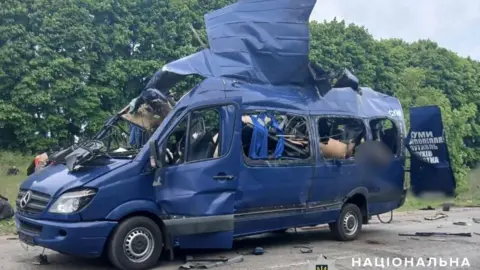
— Russian Drone Strike Kills Nine Civilians After Failed Ukraine Peace Talks The attack on Sumy’s Bilopillia follows the collapse of peace negotiations in Turkey, sparking global outrage and fears of a prolonged conflict

— Russian Drone Strike Kills Nine Civilians After Failed Ukraine Peace Talks The attack in Sumy’s Bilopillia occurred hours after Moscow and Kyiv’s talks in Turkey collapsed, heightening fears of prolonged conflict

RUSSIAN DRONE Strike Shocks Ukraine: Innocent Lives Lost After Peace Talks Collapse
— A Russian drone strike killed nine innocent people and wounded seven more in Ukraine’s Sumy region on Saturday. The attack hit a bus carrying evacuees from Bilopillia, just six miles from the Russian border.
Ukrainian President Zelenskyy called it a “deliberate killing of civilians.” He blamed Russia for refusing to agree to a ceasefire during recent peace talks. British officials also condemned the strike and urged Russia to stop its aggression.
Local leaders declared a period of mourning until Monday, calling it “Black Saturday.” The injured were taken to the hospital in Sumy as families mourn another painful loss.
This tragedy shows once again how dangerous failed diplomacy can be. Many now wonder if true peace is possible when one side refuses to stop the violence.

— New Pope Robert Prevost Elected as Pope Leo XIV He is the first US-born pontiff with Peruvian citizenship and calls for global peace, while tensions between India and Pakistan escalate with missile tests and naval drills, raising fears of accidental conflict

PAKISTAN’S Bold Missile Test Ignites Fears Of Conflict With India
— Pakistan fired a powerful surface-to-surface missile on Saturday, turning up the heat with India. This comes just weeks after a deadly attack in Kashmir. The Abdali Weapon System can strike targets up to 280 miles away and uses advanced navigation, according to Pakistan’s military.
Officials in Islamabad claim the test was only about staying prepared. But experts believe it was meant as a warning to India. The missile is named after an old Muslim conqueror of India, which adds an extra layer of meaning.
India has not responded directly but recently showed off its own naval weapons. Both sides are showing their strength as arguments over Kashmir and water rights grow more serious.
Tensions between these nuclear-armed neighbors are rising again, leaving many worried about what could happen next.

PAKISTAN MISSILE Test Ignites Fears: India-Kashmir Showdown Grows
— Pakistan fired a ballistic missile on Saturday as tensions with India climbed after a deadly attack in Kashmir. The Abdali Weapon System, which can strike targets up to 280 miles away, was tested to prove it is ready for action and has advanced navigation abilities.
India has not responded publicly to the launch. However, Indian officials blame Pakistan for the April 22 killing of tourists in Pahalgam — something Pakistan denies. The missile test comes as India threatens to end an important water-sharing deal, making things even more tense between the two countries.
Pakistani leaders celebrated the successful launch. Security experts point out that naming the missile after a famous Muslim conqueror of India sends a strong signal about intent and pride.
India’s navy also ran anti-ship missile drills recently to show its own military strength. Both countries seem set on proving they are ready for anything as their relationship grows colder by the day.

PUTIN’S Easter Ceasefire Shattered: Deadly Betrayal Leaves Ukraine in Mourning
— Three people were killed in Ukraine’s Kherson region during what was supposed to be a 30-hour Easter ceasefire announced by Russian President Vladimir Putin. Ukrainian leaders say Russian forces kept attacking, with President Zelenskyy reporting over 2,900 violations and hundreds of drone strikes during the truce.
Russia denies breaking the agreement. The Russian Defense Ministry claims its troops “strictly observed the ceasefire” and did not push forward. Instead, Moscow accuses Ukraine of nearly 5,000 violations.
Putin says fighting only started again after the truce ended. Meanwhile, Zelenskyy is calling for a longer peace or at least an end to attacks on civilians — something Russia says will only happen if Western countries stop sending weapons to Ukraine.
The back-and-forth blame shows just how little trust remains between Moscow and Kyiv. Both sides point fingers as innocent lives are lost — even on sacred holidays.

PUTIN’S Fake Ceasefire Sparks Outrage As Attacks Rock Ukraine
— Russian President Vladimir Putin announced a 30-hour Easter ceasefire, but deadly attacks still hit the Kherson region. Ukrainian officials say three people were killed and three more hurt during what was supposed to be a truce. The head of Kherson’s administration, Oleksandr Prokudin, shared these numbers with the public.
Ukrainian President Volodymyr Zelenskyy accused Russia of breaking the ceasefire over 2,900 times. He said Russian forces kept up shelling and drone strikes along the front lines. Zelenskyy told his people that “actions always speak louder than words” and promised Ukraine would only stay silent if Russia did too.
Russia’s Defense Ministry pushed back, blaming Ukraine for 4,900 violations instead. They claimed Moscow’s troops “strictly observed the ceasefire.” But as soon as midnight hit and the truce ended, fighting picked right back up across both sides.
Putin says he’ll only agree to a real ceasefire if Western countries stop sending weapons to Kyiv and if Ukraine stops calling up new soldiers — terms Ukraine flatly rejects. With both sides pointing fingers and refusing to budge, this war looks far from over.

PUTIN’S Fake Ceasefire: Ukraine Shattered by Deadly Attacks During “Truce”
— Russian President Vladimir Putin promised a 30-hour EASTER ceasefire. But while he claimed to stop fighting, Ukrainian officials say Russian attacks killed three people in Kherson and injured more. Shelling continued even as Moscow said it was honoring the truce.
Ukrainian President Volodymyr Zelenskyy accused Russia of breaking the ceasefire over 2,900 times. He said there were hundreds of drone strikes and nearly 100 assaults along the front lines during those hours. Zelenskyy made it clear — Ukraine will defend itself if attacked.
Russia’s Defense Ministry pushed back, blaming Ukraine for almost 5,000 violations instead. They insisted Russian troops stayed put and did not attack first. After the truce ended, Putin said fighting resumed and criticized Kyiv for asking Western nations for help instead of peace talks.
Putin now demands that Western countries stop sending weapons to Ukraine before any real ceasefire can happen — something Ukraine refuses to accept. As both sides trade blame over failed truces, peace looks farther away than ever in this brutal war.

RUSSIAN MISSILE Strike: Ukraine Mourns as 34 Lives Lost
— A RUSSIAN missile strike in Ukraine’s Sumy region has taken the lives of at least 34 people. President Volodymyr Zelenskiy condemned the attack, calling it terrorism and urging a strong international response. He asked the United States and European nations to take decisive action against Moscow.
This tragic event raises tensions amid ongoing ceasefire talks between Ukraine and Russia. Both countries have accused each other of breaking agreements meant to protect energy infrastructure, making diplomatic efforts more difficult.
Zelenskiy stressed the need for stronger diplomatic pressure on Russia during a CBS News interview, highlighting the urgency for global intervention in this escalating crisis.
RUSSIA’S Shocking Attack on Ukraine: EU Calls for Tough Sanctions
— European leaders are outraged by Russia’s missile attack on Sumy, Ukraine, which killed 34 and injured 117. The strike happened during Palm Sunday celebrations, marking the second major civilian tragedy in just over a week.
Polish Foreign Minister Radek Sikorski slammed Russia’s actions as mocking U.S.-led ceasefire efforts. He urged President Trump to see Russia’s blatant disregard for peace initiatives.
Finnish Foreign Minister Elina Valtonen noted the attack followed talks between Trump’s envoy and Putin, showing Russia’s indifference to peace and human life. Lithuania called using cluster munitions a war crime.
French Foreign Minister Jean-Noël Barrot demanded strict EU sanctions against Russia to cripple its economy and stop its war efforts, stressing Putin’s refusal to end hostilities willingly.

DRONE FOOTAGE Exposes Shocking Execution Of Ukrainian Soldiers
— Ukrainian soldiers were captured by Russian troops in the village of Piatykhatky. Drone footage from both sides shows conflicting stories about the incident. The Associated Press obtained these videos, revealing starkly different outcomes for the captured Ukrainians.
The Ukrainian drone video shows Russian soldiers executing four Ukrainian captives. Rollo Collins from the Center for Information Resilience confirmed this as an illegal act, not typical combat killing. This footage highlights ongoing atrocities in the conflict.
Conversely, a Russian drone video shared on pro-Kremlin social media ends with Ukrainians alive on the ground after surrendering. A Russian military blogger claimed their forces captured them without further violence. These contrasting videos underscore differing narratives and propaganda efforts from both sides in this brutal conflict.
Two videos tell two stories: one of survival and one of execution, illustrating how information warfare plays out alongside physical battles in Ukraine’s ongoing struggle against Russia’s aggression. The truth remains contested amid these digital battlegrounds, leaving room for interpretation and misinformation to thrive.
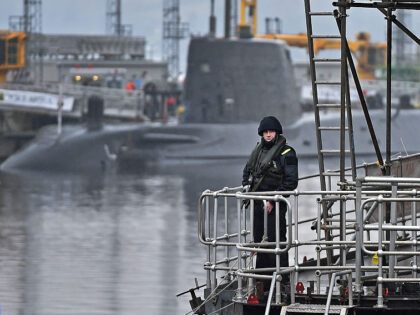
RUSSIAN ESPIONAGE Threat: UK’S Undersea Infrastructure at Risk
— Several sensing devices, believed to be of Russian origin, have washed ashore in the UK. The British Royal Navy’s mine hunting and underwater surveillance efforts uncovered more such devices. These espionage tools are allegedly intended to spy on Britain’s nuclear submarines and NATO’s critical underwater infrastructure.
Western civilization relies heavily on undersea pipelines and cables for energy and data transmission. Hostile access to this infrastructure poses risks of espionage and sabotage, including data harvesting or planting explosives. Russian autonomous submarines have been found near deep-sea data cables without support vessels, suggesting secretive operations.
The Royal Navy insists its nuclear deterrent remains undetected despite these threats. A Ministry of Defence spokesman stated that measures are being taken to secure critical offshore infrastructure against Russian activities near the UK or NATO territories. Critics argue that stronger defenses are necessary to counter these threats effectively.
Former defense minister Tobias Elwood claims the UK is already in a “grey zone war” with Russia due to these actions. He calls for increased defense capabilities against Moscow’s remote seabed platforms recharging mini-submarines mapping undersea cable networks. This situation underscores the urgent need for enhanced security measures in response to growing Russian espionage activities.
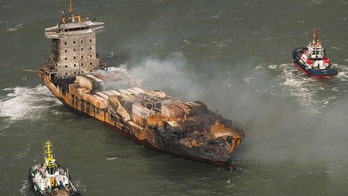
US SHIP INFERNO: Russian Captain Arrested After Fiery Collision
— A Russian national captained the cargo ship involved in a collision with a U.S. tanker off England’s coast, causing a massive fire and fuel spill. The captain is in UK police custody on suspicion of manslaughter by gross negligence. One crew member is missing and presumed dead, while all 23 aboard the U.S.-flagged MV Stena Immaculate are safe.
The Solong, flagged under Portugal, collided with the MV Stena Immaculate while it was anchored near Hull, transporting jet fuel for the American military. Ernst Russ owns the Solong, which had a mixed crew of Russian and Filipino nationals. This incident has sparked concerns about maritime safety standards and oversight.
Inspections before the collision revealed serious deficiencies on the Solong, including steering issues and inadequate safety equipment. Despite these findings during inspections in Dublin and Scotland last year, authorities did not detain the vessel. This raises questions about enforcing maritime regulations to prevent future accidents involving international vessels near U.S.-allied waters.
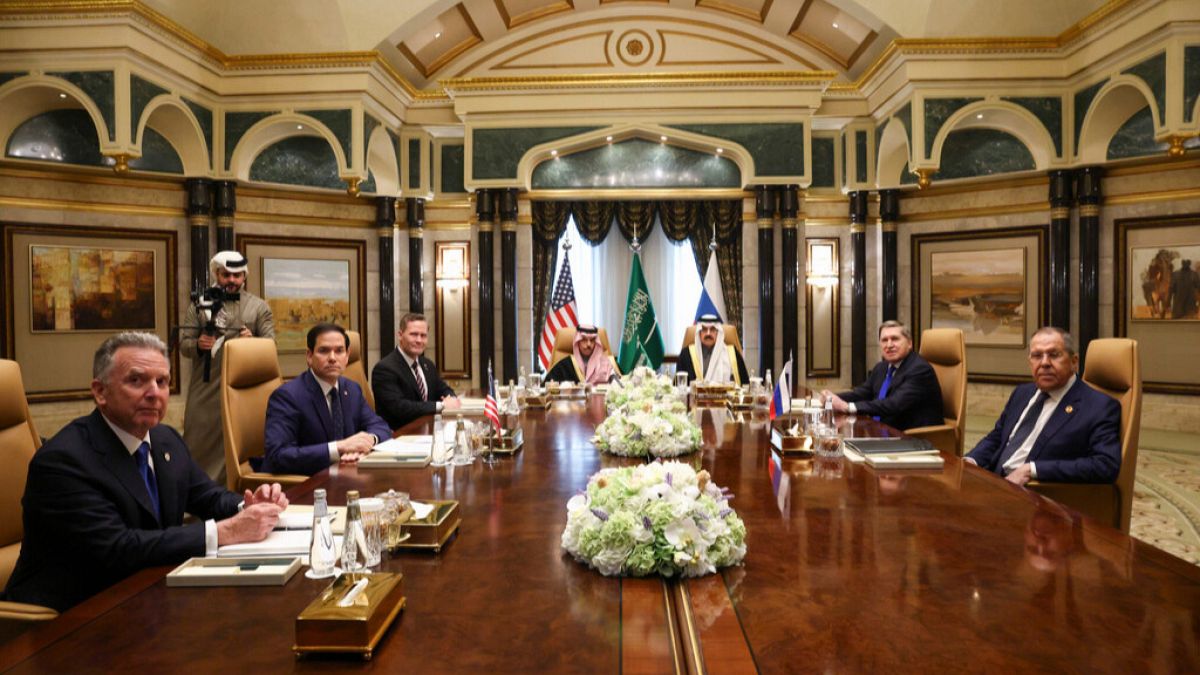
SAUDI TALKS: Ukraine’s Desperate Bid for Peace in High-Stakes Meeting
— High-stakes talks between Ukraine and the United States kicked off in Jeddah, Saudi Arabia, aiming to end Kyiv’s ongoing conflict with Moscow. This meeting follows a massive drone attack where Russian defenses shot down 337 Ukrainian drones over ten regions in Russia, resulting in two deaths and 18 injuries.
U.S. Secretary of State Marco Rubio met with senior Ukrainian officials at a luxury hotel, while Saudi Arabia’s foreign minister was present. Despite the tense atmosphere, there was no immediate comment from either side about the drone attack. The talks signal a renewed diplomatic effort after tensions rose during President Zelenskyy’s recent visit to the White House.
Ukrainian officials plan to propose a ceasefire covering the Black Sea for safer shipping routes and an end to long-range missile strikes affecting civilians. They also seek prisoner releases as part of their proposal.
Russia remains firm on its conditions for peace, demanding Ukraine abandon its NATO aspirations and recognize Russian-occupied regions as part of Russia before stopping hostilities. No concessions have been publicly offered by Moscow at this time.

US SECRET SERVICE Strikes: Russian Crypto Exchange Shutdown Sends Shockwaves
— The US Secret Service has led a global operation to shut down the Garantex cryptocurrency exchange. This is part of an ongoing effort to fight cybercrime and illegal financial activities linked to cryptocurrency platforms. Authorities targeted Garantex for allegedly facilitating hacking-related transactions.
This crackdown highlights the growing scrutiny on cryptocurrency exchanges by international law enforcement agencies. By seizing Garantex, authorities aim to dismantle networks that misuse digital currencies for illegal purposes. The move reflects a broader strategy to curb cybercriminal activities worldwide.
Further developments are expected as investigations into Garantex and its users continue. The results of these inquiries could significantly impact future regulation of cryptocurrency exchanges globally. Law enforcement remains vigilant in pursuing those who misuse digital assets for unlawful ends.
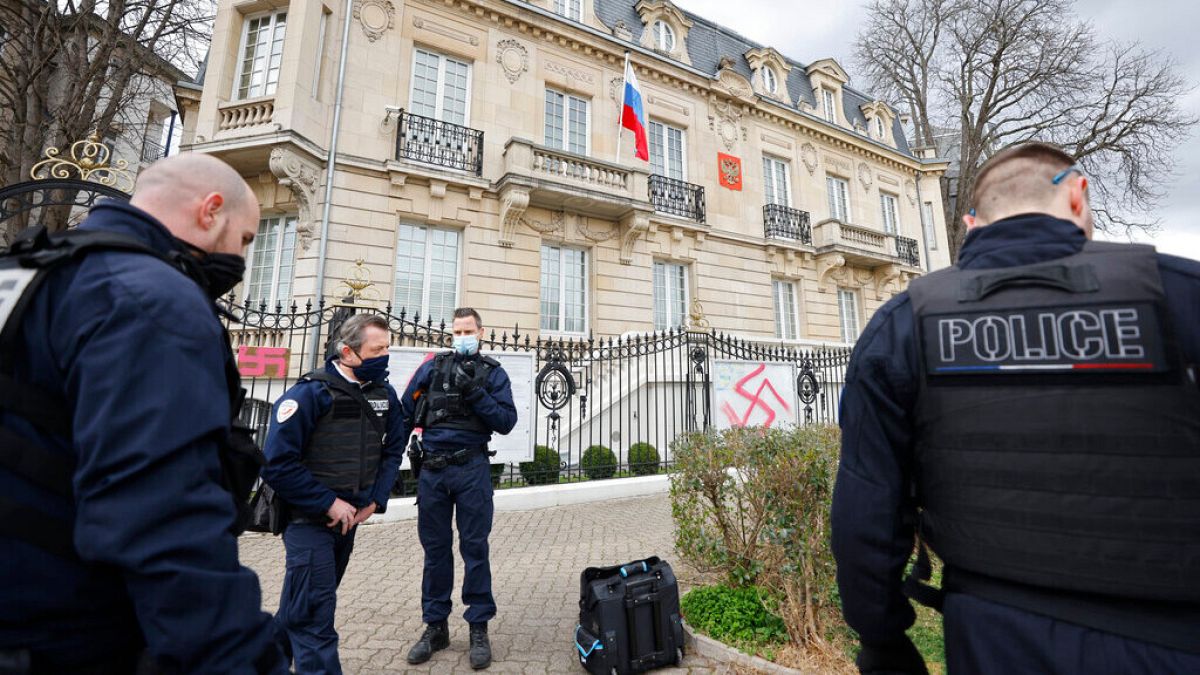
EXPLOSIVE DEVICE at Russian Consulate Ignites Fears in Marseille
— An EXPLOSIVE DEVICE went off outside the Russian Consulate in Marseille on February 24, 2025, sparking serious security concerns. Authorities quickly responded by sealing off the area and boosting security at diplomatic sites across the city. Thankfully, there were no immediate reports of injuries or casualties.
The explosion’s timing is crucial amid growing tensions between Russia and Western nations. The consulate has been a hotspot for protests against Russia’s military actions, especially its ongoing conflict with Ukraine. This incident highlights the unstable climate around Russian diplomatic missions in Europe.
Local officials condemned the attack as a threat to diplomatic safety, while Russia is expected to issue a formal response soon. These events could further strain French-Russian relations during these tense times.
French police have started an investigation to find those responsible for this attack and are conducting security checks to improve protection for foreign diplomats in France. This incident has sparked widespread concern about diplomat safety amid rising geopolitical tensions.
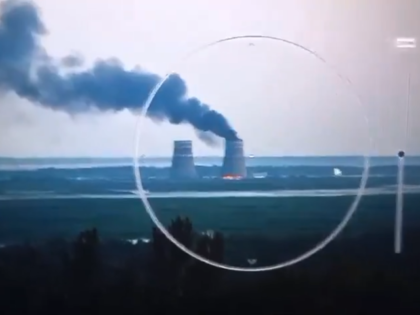
UKRAINE’S Nuclear Sites In Danger: Russian Threats Ignite Fear
— Ukraine relies heavily on nuclear power due to ongoing Russian strikes on its power grid. Over half of the country’s electricity now comes from nuclear energy. However, the unprotected nuclear switchyards, essential for transmitting this power, are at risk of attacks.
Despite warnings over a year ago, Ukraine’s Energy Ministry delayed action to secure these sites. Only recently did they start building defenses after Ukrainian intelligence pointed out potential Russian threats. Analysts say this response might be too late if an attack happens.
Oleksandr Kharchenko, a Ukrainian energy expert, warns that hitting two switchyards could cut supply for 30-36 hours and limit energy for weeks during winter. This delay in protection poses serious risks to civilian life and infrastructure resilience.
The U.N. nuclear agency has repeatedly warned about disaster potential if these switchyards are disrupted since they also help cool reactors and spent fuel at plants. Backup systems exist but are only temporary solutions during long outages, according to experts like Marcy R. Fowler from Open Nuclear Network.

ROMANIAN ELECTION Shock: Russian Interference Sparks Outrage
— Calin Georgescu, a populist candidate, was leading Romania’s election before it was nullified over alleged Russian interference. He gained support by embracing conservative values and criticizing left-wing figures like George Soros. Despite modest campaign spending, Georgescu’s social media presence drew in religious conservatives and those frustrated with government corruption.
Romania’s Constitutional Court canceled the election after intelligence reports accused Russia of using fake TikTok accounts to back Georgescu. The reports also claimed a cyberattack on the election system. These allegations led to an investigation into “electoral crimes,” sparking widespread protests from Georgescu supporters who believed the election was stolen.
Protesters flooded the streets, waving Romanian flags and demanding their votes be counted in a second round of elections. They denounced President Klaus Iohannis’s administration as illegitimate and called for his arrest, labeling government officials as “traitors.” The political unrest underscores deep divisions within Romania over foreign influence and electoral integrity.
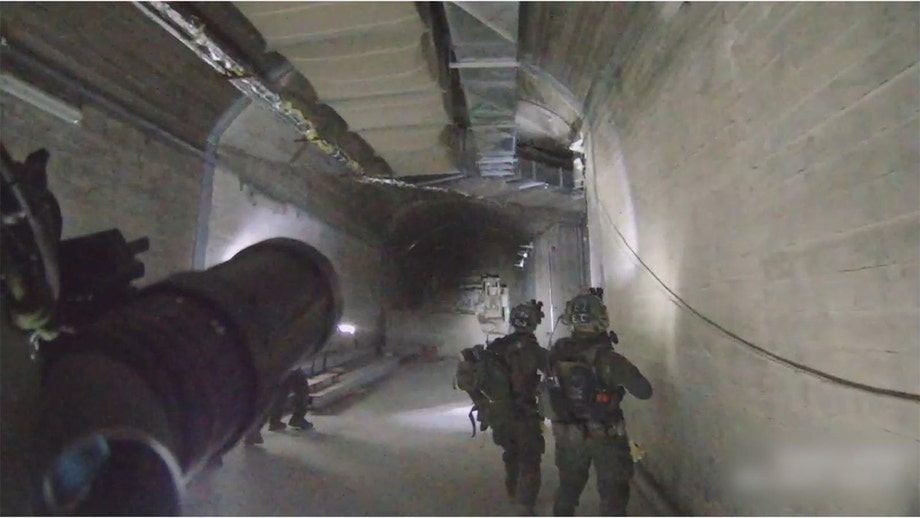
ISRAELI FORCES Strike: Secret Syrian Missile Factory Destroyed
— Elite Israeli forces carried out a bold raid in Syria, taking down an underground missile factory in September. The Israel Defense Forces (IDF) announced the mission on Thursday, calling it one of their most important operations lately. Dramatic footage showed commandos clearing the site before a huge explosion leveled the complex.
The facility was cleverly hidden within a mountain, showing its value to Syria’s military strength. During the mission, vital information about Syria’s chemical weapons program was also discovered. This finding highlights ongoing regional security issues and shows Israel’s dedication to stopping threats.

RUSSIAN GENERAL’S Shocking Death: Bombing in Moscow Sparks Global Outcry
— A senior Russian general, Lt. Gen. Igor Kirillov, died in a scooter bombing outside his Moscow apartment on Tuesday. The attack also took the life of his assistant as they left for work. Ukrainian officials claimed responsibility, linking it to criminal charges filed against him just a day before.
Kirillov, 54, led Russia’s Nuclear, Biological, and Chemical Defense Forces and faced international sanctions for his role in the Ukraine conflict. Ukraine’s Security Service accused him of using banned chemical weapons and called him a “war criminal.” An anonymous official confirmed their involvement in the attack, labeling Kirillov an "entirely legitimate target.
The SBU has documented over 4,800 instances of Russia allegedly using chemical weapons since its invasion began in February 2022. In May, the U.S. State Department reported that Russia used chloropicrin gas against Ukrainian forces. Despite these allegations, Russia denies employing chemical weapons and accuses Ukraine of deploying toxic agents instead.

RUSSIA’S Shocking Missile Strike on Kyiv: What You Need to Know
— Russia launched a missile and drone attack on Kyiv for the first time in 73 days. Air raid warnings blared as Ukrainian defense forces tried to intercept several cruise and ballistic missiles, along with up to a dozen drones. Damage assessment is ongoing, says Serhii Popko, head of the Kyiv City military administration.
These combined attacks aim to overwhelm air defenses and cause maximum damage. A 48-year-old man suffered head injuries in the Brovary district from debris. The assault also ignited a fire at a warehouse, according to Kyiv Gov. Ruslan Kravchenko.
Due to Russian shelling and power shortages, daytime electricity restrictions have been placed on businesses in Kyiv. This step aims to manage limited resources effectively amid ongoing hostilities.
The situation remains tense as officials continue assessing the full impact of this latest strike on Ukraine’s capital city.

MIRACLE at SEA: Russian Survivor Rescued After Two Months Adrift
— Emergency crews in Russia have saved Mikhail Pichugin, who drifted at sea for over two months in an inflatable boat. His brother and nephew tragically died during the ordeal, officials confirmed on Tuesday. The rescue happened after a fishing vessel spotted him near the Kamchatka Peninsula in the Sea of Okhotsk.
Pichugin, 46, went on a whale-watching trip with his 49-year-old brother and 15-year-old nephew in early August. They traveled to the Shantar Islands but disappeared after leaving for Sakhalin Island from Cape Perovsky on August 9. Despite initial rescue efforts, they stayed lost until Pichugin’s recent discovery by the Angel fishing vessel.
Reports say their boat’s engine failed, leaving them adrift with minimal supplies — only a small food ration and about 5 gallons of water. The fishing crew first mistook their radar blip for debris or a buoy before finding Pichugin using their spotlight. Shocked to find a starving man instead of junk, they quickly rescued him from his dire situation.

IRANIAN MISSILE Threat: Israel on Edge as Sirens Wail
— Sirens blared in Tel Aviv during a terror attack in Jaffa, claiming several lives. Amidst the chaos, a looming ballistic missile strike from Iran heightened tensions. Reporters were ready to cover the events but were ordered to stay put for safety reasons.
Journalists prepared their gear, but orders from New York told them to remain indoors as Iran’s attack approached. The situation became more dangerous with alarms signaling incoming missiles.
Iran launched ballistic missiles toward Israel, leaving only 12 minutes until impact. The exact timing of the strike was uncertain, adding urgency and fear to an already tense atmosphere in Tel Aviv.

UKRAINE BEGS for Long-Range Missiles Amid Russian Threat
— U.S. Secretary of State Antony Blinken and British Foreign Secretary David Lammy arrived in Kyiv on Wednesday. Ukraine is urging the West to allow it to use long-range missiles against Russia. The diplomats traveled by train from Poland following a U.S. presidential debate where Vice President Kamala Harris and former President Trump discussed the war in Ukraine.
Blinken accused Iran of providing Russia with Fath-360 short-range ballistic missiles, calling it a “dramatic escalation” of the conflict. For months, Ukraine has been requesting approval to use long-range weapons from the United States and Western allies to strike targets in Russia. Given Russia’s latest reported weapons acquisition, Ukraine is expected to press harder for these capabilities.
“We hope that long-range equipment for strikes on the territory of our enemy will be reached and we will have it,” Ukrainian Prime Minister Denys Shmyhal told Lammy during their meeting in Kyiv. Shmyhal described the meeting as “intense” but provided no further details on his Telegram channel.
At a news conference, he emphasized that destroying military targets or weapons prepared by Russia would enhance safety for Ukrainian civilians and children.
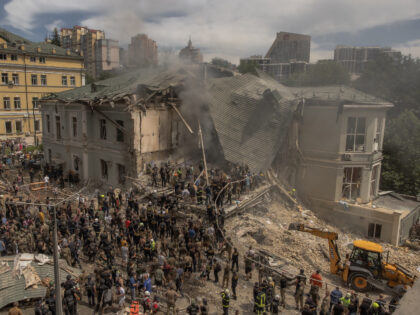
RUSSIAN MISSILE Strike Kills 17 In Ukraine: Zelenskyy Calls For Action
— A Russian missile barrage targeted five Ukrainian cities, hitting apartment buildings and public infrastructure. Ukrainian President Volodymyr Zelenskyy reported the attack on social media, noting that Kryvyi Rih, his birthplace, saw 10 people killed and 47 injured. Kyiv authorities confirmed seven deaths in the capital.
The world should not be silent about it now," Zelenskyy urged on social media. Western leaders are gathering for a three-day NATO summit in Washington to discuss continued support for Ukraine amid Europe’s largest conflict since World War II.
In Kyiv, rescuers searched for survivors at Okhmatdyt children’s hospital after a missile caused part of the building to collapse. Sixteen people were injured, including seven children. The hospital was forced to shut down and evacuate as volunteers and emergency crews worked tirelessly amid rising smoke and debris.

UKRAINE DEFENDS Against Russian Onslaught in Kharkiv
— Ukrainian troops fought off a Russian military attack in Kharkiv. President Volodymyr Zelenskyy described the conflict as intense, with Russia using missiles, drones, and artillery. The White House stands firmly behind Ukraine’s ability to endure these attacks.
Russian military sources said they aimed at Ukrainian ammo depots and troops. Yet, Kharkiv’s regional leader, Oleh Syniehubov, confirmed that his forces kept control of all territory. He noted that Russian scouts tried to enter Ukraine but were pushed back successfully.
The European Union is thinking about using money from frozen Russian assets to help Ukraine during this tough time. This plan would strengthen Ukrainian defenses and aid their recovery as the situation worsens in the area.
This move by the EU could provide crucial support for Ukraine while also putting additional pressure on Russia by targeting its financial resources.

HOUTHI MISSILE Strike on US and Israeli Vessels Heightens Maritime Tensions
— The Houthis have targeted three ships, including a U.S. destroyer and an Israeli container ship, heightening tensions in crucial maritime routes. Houthi spokesman Yahya Sarea announced plans to disrupt shipping to Israeli ports across multiple seas. CENTCOM confirmed the attack involved an anti-ship missile aimed at the MV Yorktown but reported no casualties or damage.
In response, U.S. forces intercepted four drones over Yemen, identified as threats to regional maritime safety. This action highlights ongoing efforts to protect international shipping lanes from Houthi hostilities. The situation remains tense with continued military engagements in this key area.
An explosion near Aden has underscored the unstable security conditions impacting maritime operations in the region. British security firm Ambrey and UKMTO have observed these developments, which align with increased Houthi hostility towards international shipping following the onset of the Gaza conflict
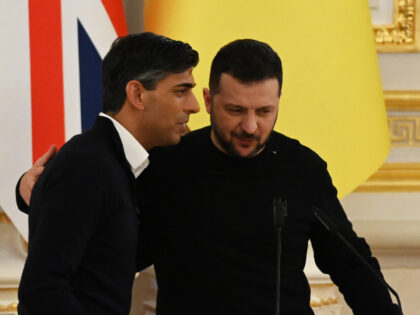
UK’S RECORD Military Aid to UKRAINE: A Bold Stand Against Russian Aggression
— Britain has unveiled its largest military aid package for Ukraine, totaling £500 million. This significant boost raises the UK’s total support to £3 billion for the current financial year. The comprehensive package includes 60 boats, 400 vehicles, over 1,600 missiles, and nearly four million rounds of ammunition.
Prime Minister Rishi Sunak stressed the critical role of supporting Ukraine in Europe’s security landscape. “Defending Ukraine against Russia’s brutal ambitions is crucial not just for their sovereignty but also for the safety of all European nations,” Sunak remarked before his discussions with European leaders and NATO’s chief. He cautioned that a victory for Putin could pose threats to NATO territories as well.
Defence Secretary Grant Shapps emphasized how this unprecedented aid would bolster Ukraine’s defense capabilities against Russian advances. “This record package will equip President Zelenskiy and his courageous nation with essential resources to repel Putin and bring back peace and stability to Europe,” stated Shapps, reaffirming Britain’s dedication to its NATO allies and European security overall.
Shapps further underscored Britain’s unwavering commitment to support its allies by enhancing Ukraine’s military strength which is vital in maintaining regional stability and deterring future aggression from Russia.

ZELENSKY’S Warning: Support Ukraine or Face Russian Dominance
— Ukrainian President Volodymyr Zelensky has delivered a clear message to the U.S. Congress: without further military aid, Ukraine might lose to Russia. In discussions with House Speaker Mike Johnson, Zelensky will argue against any hesitation in providing the funds needed to fight Moscow’s forces. This plea comes despite Ukraine already receiving over $113 billion in aid from Kyiv.
Zelensky is asking for billions more, but some House Republicans are hesitant. He warns that without additional support, Ukraine’s fight becomes “difficult.” The delay in Congress not only puts Ukrainian strength at risk but also challenges worldwide efforts to counter Russian hostility.
On the 120th anniversary of the Entente Cordiale alliance, leaders from Britain and France joined Zelensky’s call for support. Lord Cameron and Stéphane Séjourné emphasized that meeting Ukraine’s requests is crucial for maintaining global security and preventing Russia from gaining further ground. Their agreement shows how vital U.S. decisions are for international peace and stability.
By backing Ukraine, Congress can send a strong message against aggression and protect democratic values worldwide. The choice is stark: provide the necessary aid or risk enabling a Russian victory that could destabilize global order and undermine efforts to promote freedom and democracy across borders.

UNJUSTIFIED IMPRISONMENT: WSJ Journalist Faces Grueling Year in Russian Detention
— Wall Street Journal reporter Gershkovich faces a daunting prospect of spending over a year in pretrial detention in Russia, following the latest appeal rejection. The WSJ points out that Russian prosecutors wield extensive power to demand further extensions of pretrial detention. Espionage trials, typically shrouded in secrecy, almost invariably end with convictions and long prison terms.
Gershkovich’s previous pleas for bail or house arrest have been denied. He is currently confined to Moscow’s notorious Lefortovo prison. The WSJ editorial team continues to press for his immediate release, branding his arrest as an “unjustifiable assault on press freedom.” The Biden administration has labeled the charges against Gershkovich as “groundless” and maintains he is imprisoned for "merely reporting news.
U.S. Ambassador to Russia Lynne Tracy condemned the Kremlin’s tactic of using human lives as negotiation tools, leading to real suffering. However, Kremlin spokesman Dmitry Peskov refuted claims of holding Americans hostage — including Gershkovich and recently detained Russian-American ballerina Ksenia Karelina — insisting foreign journalists operate freely within Russia until suspected of breaking the law.
Karelina was apprehended on accusations of “treason” after making a donation to a Ukrainian charity — an incident that unfolded in Yekaterin

UKRAINIAN FAMILY’S Heartwarming Reunion After Two-Year Russian Captivity Nightmare
— Kateryna Dmytryk and her toddler son, Timur, experienced a joyous reunion with Artem Dmytryk after nearly two years of separation. Artem had been held captive in Russia for the majority of this time and was finally able to meet his family outside a military hospital in Kyiv, Ukraine.
The war initiated by Russia has dramatically altered the lives of countless Ukrainians like the Dmytryks. The nation now divides its history into two periods: before and after February 24, 2022. During this time, thousands have grieved for lost loved ones while millions have been compelled to leave their homes behind.
With over a quarter of Ukraine’s land under Russian control, the country is immersed in a grueling war. Even if peace is eventually achieved, the consequences of this conflict will disrupt life for future generations.
Kateryna recognizes that recovering from these traumas will take considerable time but allows herself a brief moment of happiness during this reunion. Despite enduring severe hardships, the Ukrainian spirit remains resilient.
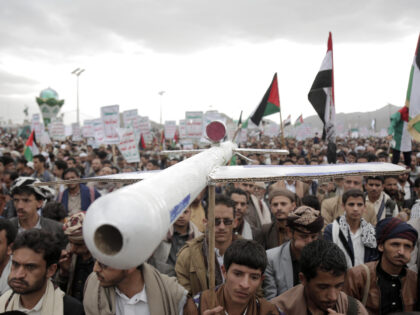
US NAVY SAVES the Day: Huthi Missile Attack on Oil Tanker Thwarted
— The Huthis, a rebel group based in Yemen, announced that they had targeted a British oil tanker, named the Pollux, in the Red Sea using missiles. The US Central Command (CENTCOM), however, clarified that this vessel is actually Danish-owned and registered in Panama.
CENTCOM confirmed that from areas of Yemen under Huthi control, four anti-ship ballistic missiles were launched. It was reported that at least three of these missiles were directed towards MT Pollux.
In reaction to this looming threat, CENTCOM successfully executed two self-defence strikes against one mobile anti-ship cruise missile and one mobile unmanned surface vessel located in Yemen. This incident happened just as Washington’s reclassification of the Huthis as a terrorist group became official along with related sanctions.
This event underscores the importance of vigilance and quick action in maintaining security on international waters. It also highlights Washington’s commitment to combating terrorism globally.
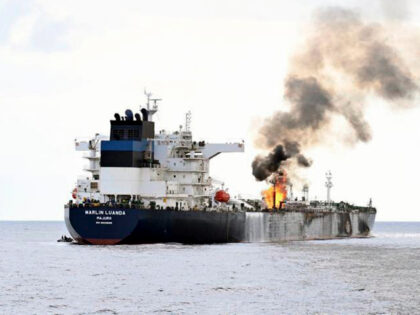
RUSSIAN Oil Tanker ENGULFED: Houthi Missile Strike Sparks Fear in Gulf of Aden
— A Houthi missile strike recently ignited a Russian oil tanker, the Marlin Luanda, in the Gulf of Aden. The vessel was carrying Russian naphtha when it was targeted. The attack resulted in a fire breaking out in one of the cargo tanks. Fortunately, the blaze was put out promptly and no crew members were injured.
The incident prompted immediate reactions from other vessels in the area. Another oil tanker quickly reversed its course to escape potential danger. Meanwhile, U.S Central Command (CENTCOM) took action to neutralize an imminent threat posed by a Houthi anti-ship missile towards merchant and U.S Navy vessels operating nearby.
The attack has had economic repercussions as well, causing a 1% surge in oil prices due to concerns over potential disruptions to oil flow through the Red Sea region. This event marks the most severe Houthi assault on oil tankers till date and serves as a stark reminder that even Russian oil is not safe from Yemen’s Iran-backed insurgents’ attacks.
Interestingly, despite targeting a vessel carrying Russian cargo managed by London-based Oceonix Services Ltd., Houthis claimed their target was actually a “British ship”. This discrepancy could potentially fuel geopolitical tensions moving forward.
US-Owned Ship UNDER FIRE: Houthi Rebels Escalate Red Sea Tensions
— In a recent escalation of Red Sea tensions, Houthi rebels launched a missile attack on a U.S.-owned ship, the Gibraltar Eagle. The strike occurred off Yemen’s coast in the Gulf of Aden and comes less than a day after an anti-ship cruise missile targeted an American destroyer in the same area. Responsibility for these attacks has been claimed by the Houthis, following American-led strikes against rebel forces.
The United Kingdom Maritime Trade Operations (UKMTO) reported that this latest attack happened approximately 110 miles southeast of Aden. The captain of the ship reported that a missile struck the port side from above. Private security firms Ambrey and Dryad Global identified the attacked vessel as Eagle Gibraltar, registered under Marshall Islands’ flag as a bulk carrier.
The U.S military’s Central Command has confirmed this strike but reports no significant damage or injuries aboard Eagle Gibraltar which continues its voyage undeterred. Brigadier General Yahya Saree, Houthi military spokesman, took responsibility for this attack during his televised address on Monday night.
Saree declared all American and British ships involved in aggression against Yemen as hostile targets during his address. These attacks are causing disruptions to global shipping amidst Israel’s ongoing conflict with Hamas in Gaza — impacting vital routes linking Asian and Middle Eastern energy and cargo shipments to Europe via Suez
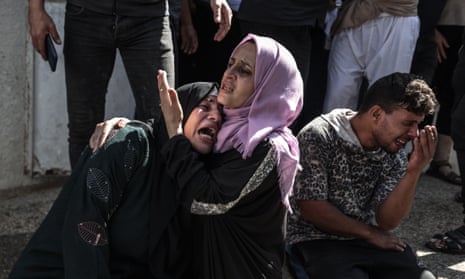
LEBANON STRIKES: Hezbollah’s Deadly Missile Attack Rattles Israel Amidst Gaza Conflict
— A lethal anti-tank missile, launched from Lebanon, claimed the lives of two civilians in northern Israel this past Sunday. This alarming incident has ignited concerns over a potential second front emerging amidst the ongoing clash between Israel and Hamas.
This strike marks a grim milestone — the 100th day of a war that has tragically taken nearly 24,000 Palestinian lives and forced approximately 85% of Gaza’s population from their homes. The conflict was sparked by an unexpected Hamas incursion into southern Israel last October, leading to around 1,200 fatalities and roughly 250 hostages.
The region remains on edge as daily fire exchanges persist between Israel and Lebanon’s Hezbollah group. Meanwhile, Iranian-backed militias target U.S. interests in Syria and Iraq as Yemen’s Houthi rebels threaten international shipping lanes.
Hezbollah’s leader, Hassan Nasrallah, remains defiant vowing to persist until a Gaza cease-fire is established. His declaration comes as countless Israelis evacuate northern border regions due to escalating aggression.
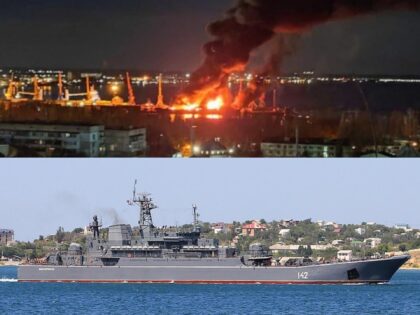
UKRAINE’S Crushing Blow: Russian Warship Decimated by Air-Launched Missile Attack
— On Christmas Day, Ukraine demonstrated its formidable military might. The country claimed a significant victory, saying it had annihilated another Russian warship, the Ropucha-class Novocherkassk, using an air-launched cruise missile. Russia confirmed the assault on their landing ship from the 1980s, which is comparable in size to the U.S.-made Freedom-class warship. They reported one casualty from this attack.
Lieutenant General Mykola Oleshchuk of the Ukrainian Air Force praised his pilots’ exceptional performance. He observed that Russia’s naval fleet continues to dwindle in size.
Yurii Ihnat, a spokesperson for the Ukrainian armed forces, disclosed further details about this strike. He revealed that fighter jets unleashed a volley of Anglo-French Storm Shadow / SCALP cruise missiles at their target. Their goal was for at least one missile to bypass Russian air defenses successfully. The magnitude of the resulting explosion indicated that onboard ammunition likely detonated.
Ukrainian state media circulated footage allegedly showing a massive explosion and towering fire column following the initial hit — evidence suggesting onboard ammunition
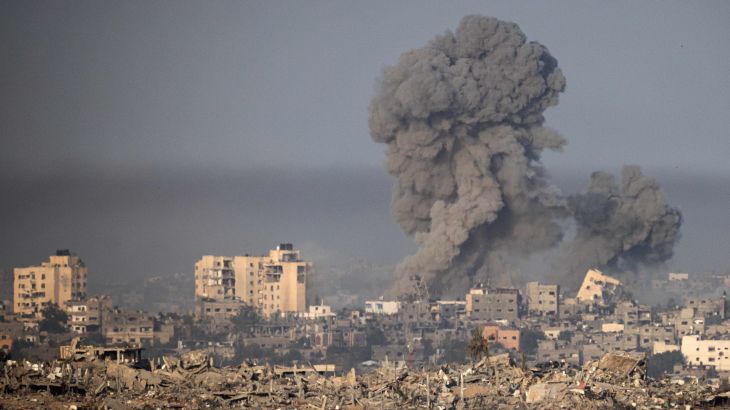
ISRAEL-HAMAS Conflict: The Rising Tensions and Shocking Russian War Crime Probes
— Defense reporter Mike Brest from the Washington Examiner recently delved into the intensifying Israel-Hamas conflict. He sat down with Magazine Executive Editor Jim Antle to discuss this escalating issue, which has seen a worrying increase in casualties in Gaza.
Brest didn’t stop there; he also shed light on ongoing investigations into potential Russian war crimes in Ukraine. This new development brings an added layer of complexity to an already strained global situation.
The persistent conflict between Israel and Hamas, along with Russia’s alleged misdeeds, is stirring unease across the globe. As these situations continue to evolve, they promise to have profound impacts on international relations and worldwide stability.
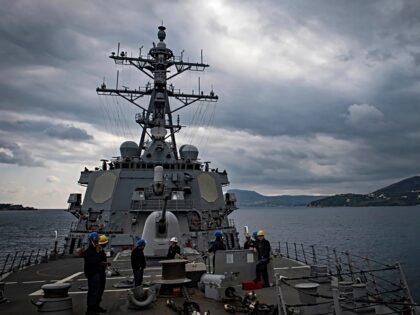
RED SEA Chaos: Iranian-Backed Houthis Unleash Missile Attacks on Commercial Ships, US Destroyer Strikes Back
— Central Command has verified four missile attacks on three commercial ships in the Red Sea. One of these was an Israeli-owned vessel. The Houthis in Yemen initiated the attacks, but they were “fully backed by Iran,” according to a statement released Sunday. The USS Carney, a U.S. destroyer, retaliated by shooting down two drones.
The assaults started at 9:15 a.m. local time when the Carney detected an anti-ship missile launched from Houthi-controlled areas in Yemen at the M/V Unity Explorer. This ship is flagged by Bahamas and U.K owned with crew members from two nations. However, USNI News and Balticshipping.com report that Tel Aviv-based Ray Shipping owns it.
Around noon, Carney responded to and shot down a drone also launched from Houthi-controlled areas in Yemen. Central Command stated that it was uncertain whether the drone specifically targeted CARNEY or not but confirmed no damage to the U.S vessel or injuries to personnel.
These attacks pose a direct threat to international commerce and maritime security,“ Central Command said in its statement. It added that it would consider appropriate responses ”in full coordination with its international allies and partners.

STOLTENBERG’S Pledge: NATO Commits a Whopping $25 Billion in Ammunition to UKraine Amid Russian Tensions
— NATO Secretary-General Jens Stoltenberg and Ukrainian President Volodymyr Zelenskyy convened on Thursday, amid rising tensions with Russia. Their meeting came on the heels of Russia’s allegations that Ukraine’s Western allies aided in a recent missile strike on the Black Sea Fleet’s base in Crimea.
Zelenskyy shared that Stoltenberg has committed to helping Ukraine secure more air defense systems. These are vital for safeguarding the nation’s power plants and energy infrastructure, which took a heavy hit during Russia’s aggressive attacks last winter.
Stoltenberg unveiled NATO contracts totaling 2.4 billion euros ($2.5 billion) for ammunition supplies destined for Ukraine, including Howitzer shells and anti-tank guided missiles. He stressed, “The stronger Ukraine becomes, the closer we get to halting Russia’s aggression.”
On Wednesday, Russian Foreign Ministry spokeswoman Maria Zakharova alleged that resources from the U.S., U.K., and NATO facilitated the attack on their Black Sea Fleet headquarters. Yet these claims remain unbacked by concrete evidence.
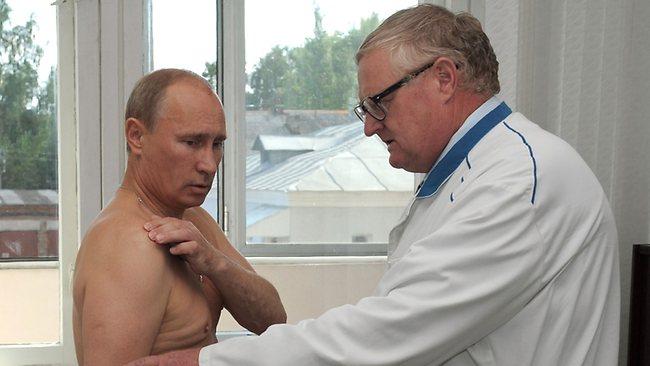
NEW Report Claims PUTIN Suffers from ‘Blurred Vision and Numb Tongue’
— A new report suggests that Russian President Vladimir Putin’s health has worsened, with him suffering from blurred vision, numbness of the tongue, and severe headaches. According to the General SVR Telegram channel, a Russian media outlet, Putin’s doctors are in a state of panic, and his relatives are “worried.”

Video
INDIA-PAKISTAN Missile Shock: Rising Fear of WAR Grips Region
— Tensions are soaring between INDIA and PAKISTAN after Pakistan fired a new ballistic missile on May 3rd. This came right after a deadly shooting in Kashmir, with both sides blaming each other. Pakistan’s military said the test showed “operational readiness.” India hit back, threatening to cut off a key water-sharing deal.
Experts say the timing is no accident. India answered with its own naval missile drills, making it clear they won’t step aside. Many warn these moves could lead to an accidental clash as both countries ramp up tough talk.
The United Nations and world leaders are urging calm. They want both nuclear-armed nations to talk before things get worse. Trouble in this area could upset water supplies and put global security at risk.
So far, neither side has started direct fighting, but things are tense. With armies on alert and tempers flaring, the next few days will show if peace holds or if violence breaks out.
